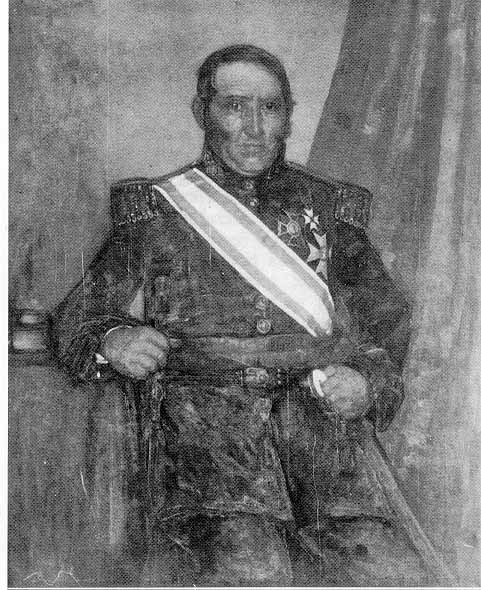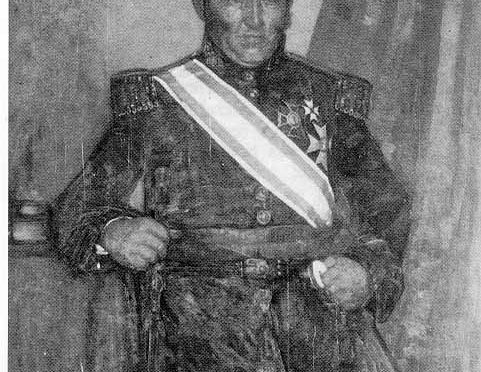The military conflicts that surrounded the Basque Country in the early 1800s changed the fortunes of many. Comrades in one war fought against each other in the next. Heroes were exiled only to be called upon again when the politics of Spain shifted. Gaspar de Jauregui saw it all. Starting as a guerrilla fighter, he became Brigadier of the forces in the Basque Country. At the same time, his politics forced him into exile more than once.

- Gaspar de Jauregui y Jauregui was born in Urretxu, Gipuzkoa, on September 15, 1791, to Miguel de Jauregui and Escolástica Jauregui Izaguirre. Little is known about his life before the Peninsular War (also known as the War of Independence in Spain) when, in 1807, Napoleon and his forces invaded Spain. It is thought that he tended farm animals, as implied by his nickname Artzaya, or The Shepherd. However, there was evidence that he was a postal worker.
- In 1809, Jauregui volunteered for a Gipuzkoan regiment. By 1810, he had become an officer, Second Lieutenant of infantry. He quickly rose in the ranks and only a few years later, in 1812, he was a Commander. He retired at the end of the war with the rank of Colonel in 1814. However, his career stalled at that point, possibly because of his liberal politics. It wasn’t until the First Carlist War which started in 1834 that he again saw military recognition, joining as Brigadier and reaching Field Marshall only a few years later.
- Jauregui is most widely known for his guerrilla activities during the Peninsular War. In 1809, he joined the rebel groups in Nafarroa against Napoleon. He transformed the irregular guerrillas into an effective troops, which allowed him to undertake larger actions against the invaders. During these attacks, his horse was shot from underneath him at least twice and he received several wounds himself – in one case he was hit in the chest and it was only the bag of money he was carrying that saved him. It was during this time that Tomas Zumalakarregi, future Carlist general, served under The Shepherd.
- From 1824 to 1832, he was exiled to France. This was a consequence of his aligning against the absolutist monarchy that Ferdinand VII was imposing upon Spain. Jauregui had participated in the Liberal Triennium, a period of three years of liberal government that was installed after Ferdinand’s first attempt at imposing an absolutist monarchy. When Ferdinand was returned to power by help of France, Jauregui had to flee the country.
- At the beginning of the First Carlist War in 1833, he was recalled to Spain to help counter the uprising against Princess Isabella by the Carlists, the supporters of her uncle Carlos de Borbón. Specifically, he was asked to organize the chapelgorris, a unit of volunteers fighting on the Liberal side against the Carlists. The war saw Jauregui fighting against his former comrade Zumalakerregi, who, with the other Carlist forces, captured much of Gipuzkoa and Bizkaia.
Primary sources: Rilova Jericó, Carlos. Jauregui y Jauregui, Gaspar de. Auñamendi Encyclopedia. Available at: https://aunamendi.eusko-ikaskuntza.eus/en/jauregui-y-jauregui-gaspar-de/ar-63824/; Gaspar de Jáuregui, Wikipedia; Gaspar de Jauregui, ‘Artzaia’, Diaro Vasco



Greetings,
All this fighting, wars, heroes in the Basque region between France and Spain, to us European, it is nothing new. What broke up and reduce he Basque country to what it is now is when they lost the law of inheritance.
Without going into all the details of dates and who did what and when, in Spain, the first male would inherit everything but they had the moral and financial obligation to look after their siblings. In case of death of the first male, it went down the line from male to male. In large family, as it was often the case, the youngest one got the short end of the straw. They had two choices; join the army or the priesthood or exile. Such was the case of many and one example is the founder of St. Louis, La Clede. The girls went into a convent. Girls had not rights. If no one left to inherit the holdings, it went to the state.
The Basques were smarter, the first born, male or female would inherit everything. Or course, with the same moral and financial obligations. It was a safety precaution to keep the ixta, the property intact. If two first born married, one had to give up the right of inheritance so not to have a monopoly of large land holdings. The Basque region extended all the way to Burgos and a bit beyond. Once they lost that law, the land was broken up little by little.
For women to inherit a large estate was a big deal!! and they held their own. It may be one of the reason, I think , why Basques women, in the old country are tough Mamas.
Any time there is a war between France and Spain, in spite of the conflict, Spaniard take refuge in France and they are welcomed. There is an unspoken bond between the French and Spanish Basque that American Basques cannot understand. Because the Americans, Basque or others never saw a war on their soil.
Monique
The Basque region extended all the way to Bordeaux and the Garonne. I believe there were even dukes of Gascony (Vasconia) with typically Basque and Euzko-Hispanic names such as Lope (hence López), García (hence Garcés), Jimeno (hence Jiménez), and Sancho (hence Sánchez).